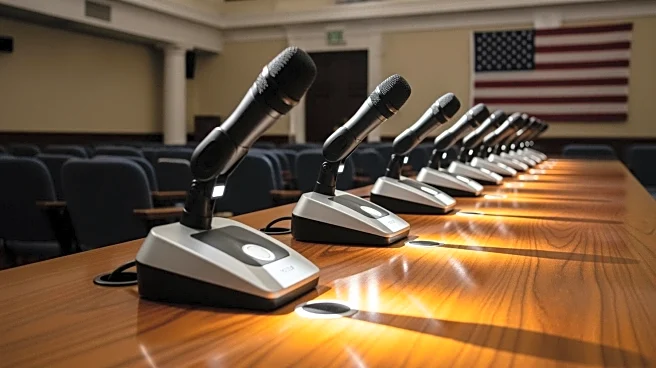What's Happening?
The Pentagon has introduced new regulations requiring journalists to sign agreements that restrict them to reporting only officially approved information. This move has led to a significant number of reporters
leaving the Pentagon, as they view the rules as a direct assault on press freedom. The new policy mandates that refusal to sign the agreement results in expulsion from the building. The changes have sparked concerns about the violation of First Amendment rights, which guarantee press freedom. The Pentagon press corps, historically known for its professionalism and dedication to factual reporting, is now facing challenges in maintaining its role as a watchdog over government activities.
Why It's Important?
The implementation of these new rules at the Pentagon is significant as it raises concerns about the erosion of press freedom in the United States. The press plays a crucial role in ensuring transparency and accountability in government operations. By restricting journalists' ability to report freely, the Pentagon's actions could undermine public trust in government institutions and limit the flow of information to citizens. This development may also set a precedent for other government agencies, potentially leading to broader restrictions on media access and reporting. The situation highlights the ongoing tension between national security interests and the rights of the press.
What's Next?
The fallout from the Pentagon's new press rules is likely to continue as journalists and media organizations assess their options. Legal challenges could be mounted against the policy, citing violations of constitutional rights. Advocacy groups and civil society organizations may also increase pressure on the government to reverse the decision. The situation could prompt discussions in Congress about the balance between national security and press freedom, potentially leading to legislative action. The response from the broader media industry will be crucial in shaping the future of press access to government information.
Beyond the Headlines
The Pentagon's decision to restrict press access may have deeper implications for the relationship between the government and the media. It raises ethical questions about the role of journalism in a democratic society and the responsibilities of government officials to uphold constitutional rights. The move could also influence public perception of the Pentagon and its commitment to transparency. In the long term, this development may contribute to a shift in how media organizations approach government reporting, potentially leading to increased reliance on alternative sources and investigative journalism.









